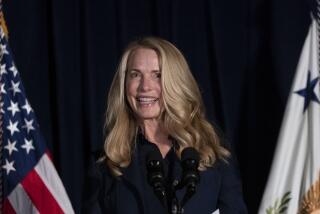To millions, he was Steve
- Share via
LOS ANGELES AND SAN FRANCISCO — Candles flickered outside Apple stores, where bouquets of flowers encircled photos of Steve Jobs. Thousands of online mourners replaced their Facebook photos with the black Apple logo. And tributes flooded in from world leaders and industry pillars, including Apple’s most bitter rivals.
The outpouring of sentiment -- the kind usually reserved for pop culture icons like John Lennon or Michael Jackson -- was unprecedented for a corporate executive.
Why so much adoration for Jobs?
Obviously, many people were saddened that a brilliant life was cut short. But perhaps more than that, Jobs had become the face of the personal technology revolution, presiding over an era when people brought computers into their homes, when portable phones and music players sprouted from every pocket, and when excitement about electronic devices crossed over from a nerdy niche to the mainstream.
“Steve was not your typical CEO,” said David B. Yoffie, a professor at Harvard Business School. By being a force in the movie and music industry as well as in the technology business, “he cut across the cultural boundaries: He was like a movie star on the one hand and a corporate executive on the other.”
To bridge the gap between nuts-and-bolts electronics and pop culture, his peers said, Jobs repeatedly took technologies that seemed clunky, bland or faceless and spun them into a kind of lifestyle accessory that people the world over wanted to own.
“What Steve did was he added the fashion flair to technology,” said Scott McNealy, co-founder and former chief executive of Sun Microsystems. “The fact that it looked cool was a big part of it all -- nobody else has really captured that.”
Unlike famed American innovators of the past like Thomas Edison and Henry Ford, Jobs had the benefit of living in a society saturated by media, where his photograph showed up on dozens of magazine covers and websites and where videos of his product unveilings were widely watched.
Savvy from decades of experience with the media, Jobs learned how to exercise careful control over his public image while maintaining an almost obsessive secrecy about his private life.
Jobs rarely appeared in public and in the later years of his reign at Apple gave few media interviews.
When he died Wednesday, Apple declined to confirm the location or cause of his death or the names of his survivors.
He was a tremendous promoter of his own mystique, said Jeffrey Sonnenfeld, a professor at the Yale School of Management who studies business leaders. Jobs thought of his work at Apple as “part of his quest for immortality.”
But in his familiar ensemble of bluejeans and black mock turtleneck, Jobs still seemed easier for the public to relate to than most suit-wearing executives. With the simple email address of steve@apple.com, he would occasionally converse directly with fans and detractors, replying to questions and complaints with one-liners:
“I think so.” “We disagree.” “You won’t be disappointed.”
“It’s very hard to imagine another CEO who was referred to by only his first name by millions and millions of people who never met him,” said Paul Saffo, a managing director at investment research firm Discern Analytics and a longtime Silicon Valley forecaster. “It’s extraordinary, the intimacy people feel to a CEO they never met.”
“When I found out he died, it really affected me,” said Angelo Santos, 45, who brought his wife from their Silver Lake home to light a red candle outside the Apple store at the Grove shopping center in Los Angeles’ Fairfax district.
On Thursday the candle burned inside a velvet cordon that also protected flowers and a green apple with a bite taken out of it.
It’s an “homage to the man that has made technology so fun for me,” said Santos, who has used Apple products for nearly 25 years.
Those who knew Jobs often spoke of his passion for his creations.
“It sounds ridiculous to talk about love when you are making a gadget,” said Larry Brilliant, the former director of Google’s philanthropic arm, Google.org, and a longtime friend of Jobs.
“But Steve loved his work, he loved the products he produced, and it was palpable,” Brilliant said. “He communicated that love through bits of steel and plastic.”
--
david.sarno@latimes.com
jessica.guynn@latimes.com
Sarno reported from Los Angeles and Guynn from San Francisco. Times staff writer Shan Li in L.A. contributed to this report.
--
(BEGIN TEXT OF INFOBOX)
--
Key Apple executives
--
Timothy D. Cook
Title: Chief executive
Age: 50
Education: Bachelor’s in industrial engineering, Auburn; MBA, Duke
Career: Joined Apple in 1998 and became chief operating officer in 2005. Cook acted as interim CEO during Steve Jobs’ leaves in 2004, 2009 and 2011.
--
Scott Forstall
Title: Senior vice president of iPhone software
Age: 42
Education: Bachelor’s in symbolic systems, Stanford; master’s in computer science, Stanford
Career: Joined Apple in 1997. Responsible for several releases of the Macintosh operating system, including Leopard.
--
Philip Schiller
Title: Senior vice president of worldwide product marketing
Age: 51
Education: Bachelor’s in biology, Boston College
Career: Joined Apple in 1997. Schiller oversees Apple’s marketing and advertising and its App Store.
--
Jonathan Ive
Title: Senior vice president of industrial design
Age: 44
Education: Bachelor’s in design, Newcastle Polytechnic, England
Career: Joined Apple in 1992. Ive has been responsible for the physical design of such products as the iMac, iPod, iPhone and iPad.






